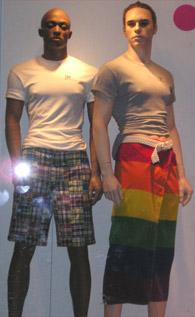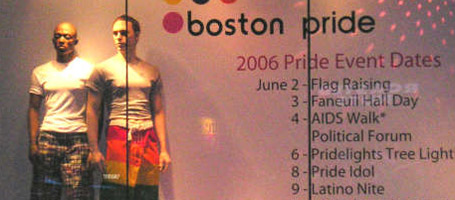"They were male mannequins with enlarged breasts, and one was wearing a skirt," said president Brian Camenker of the anti-gay group MassResistance in Boston, Massachusetts.
"It was really disgusting," he added.

Close-up shots provided by massresistance.com which protested the Boston Pride window displays. It remarked on its website: ''...when was the last time you saw male store mannequins with breasts like those? What's that all about?''
Nonetheless, acting on phone and email complaints from Camenker's fringe group, Macy's department store removed the two "gay" mannequins from their Boston Pride store window display.
This retreat by Macy's upset not only the gay and lesbian community, but also the mayor, Thomas M. Menino. His spokesman said he was "disappointed that Macy's would bow to this kind of pressure."
"The mayor believed the window reflected the diversity of our city," spokesman Seth Gitell said. "This entire episode flies in the face" of that.
The original display had been designed in consultation with the Boston Pride Committee and included a list of Pride events on the backdrop behind the two mannequins. In their attempt to please both sides, Macy's removed the mannequins and scrubbed out the Pride's URL but retained the list of events.
Interestingly, MassResistance seemed mostly mollified. On a related website, it proclaimed, "Macy's backs down - downtown Boston department store removes the most offensive parts of window display."
The visual, anthropomorphic representation of homosexuality bothered them more than the idea of a Pride Week, even though the former were just lifeless mannequins with no known sexual orientation. The physicality of the pronounced pectorals and the feminisation that the "skirt" represented were apparently "the most offensive parts" in the minds of MassResistance.
To understand this, one has to recall how heterosexism bestows on the male a predatory power over matters sexual. The male is cast as dominant and the female submissive, he as pursuer and she as pursued. Modern homosexuality however sees and presents males as objects of sexual desire, but to those who conceive of gender in power terms, such a reversal feels like emasculation. The extreme focus on "breasts" and the "skirt" comes about precisely because they most acutely represent the role reversal and the frightening vulnerability that that implies.
Thus, this incident once again underscores how homophobia is a gut-level reaction, much more than an intellectual position. It's gay imagery that roils MassResistance and their ilk more than the abstract idea of sexual orientation. Indeed, one might say, it really is the flaunting that provokes the ape-like aggression.
Sure, they try to rationalise it. It so happened that the same week, President George W Bush flagged his support for a constitutional amendment to ban gay marriage. As the talking point of the week, there were plenty of examples of the most creative logic against homosexuality and gay marriage from numerous Republican senators and other worthies.
William Bennett, the former Education Secretary, in a TV interview by Jon Stewart for example, boasted about how America was "the land of freedom." This was true for gays and lesbians too, he said, "when it comes to living freely in this country... and living happily."
But "there are limits to freedom" and one thing that's outside of those limits is marriage, he averred.
According to Bennett, gay marriage should never be legalised because of the example of Scandinavia and Holland, specifically those countries' high divorce rates and children born out of wedlock.
When challenged to make the connection, he tracked backwards to the position that these were symptoms of a society where "marriage is taken less seriously."
Apparently, in his view, legalising gay marriage would perpetuate high heterosexual divorce rates. And more babies might be born out of wedlock.
The American debate about gay marriage is sometimes great fun to watch, it being so full of impossible contortions of logic.
Meanwhile, logic goes nowhere in Singapore
The Singapore debate about gay people in our midst - not even gay marriage - is virtually non-existent. It's a struggle even to take the subject anywhere in private conversation. Most people respond with platitudes.
"Gays and lesbians? I'm fine with it. I have quite a few gay friends, you know."
"I don't see why anyone's sexuality is anybody's business but his own."
Then there are those who try to "put things in context." In this world, they would say, there are so many different kinds of discrimination: colour, age, income level or physical disability. With those examples, you can sense where they're taking that conversation: We are such crybabies, they mean to say. We are so self-absorbed, concerned only about how we are discriminated against when others fare worse.
Just a week ago, it happened again. I was having coffee with an old friend when his ex-colleague walked past by chance. He introduced me to her as a "gay activist," which promptly brought forth the enquiry, "Why, of all the different kinds of activist, do you want to be a gay activist?"
I'm rarely floored by gay-related questions, but I have to admit, this one nearly knocked me over. Of course, the answer was that this was an issue that mattered greatly to me, but this only elicited the "but there are so many different kinds of discrimination" response.
Sensing my rising bile, she quickly assured me that she had lots of gay friends, in fact, she said, she suspected her boss at work was (hushed tones here) a lesbian.
Wow.
"But it makes no difference to me," she made it a point to add. She herself strongly felt that sexuality was one's "private decision" and that "discrimination in any form is wrong."
"Indeed," I replied, "except that in Singapore it's more than just social discrimination. The state creates and sustains that discrimination through its laws."
"I know about that," she said, which only made me wonder if she had known about that.
At that point, I felt I had to cut to the chase. "Let me ask you then, do you think such laws should be repealed? Would you openly support repeal?"
"Well," she hesitated, "erm... ah... maybe there are reasons for that."
Out of deference to my friend, I didn't want to go for the jugular, though I was sorely tempted. In that sense, I suppose I am part of the problem here in Singapore - always preferring to eschew confrontation. As a society, we keep an outward peace, but homophobia breeds just as much beneath the surface.
Alex Au has been a gay activist for over 10 years and is the co-founder of People Like Us. Alex is the author of the well-known Yawning Bread web site. For more on the Singapore GE, visit Yawning Bread. He can be contacted at yawning@geocities.com.












 Printable Version
Printable Version










Reader's Comments
Be the first to leave a comment on this page!
Please log in to use this feature.